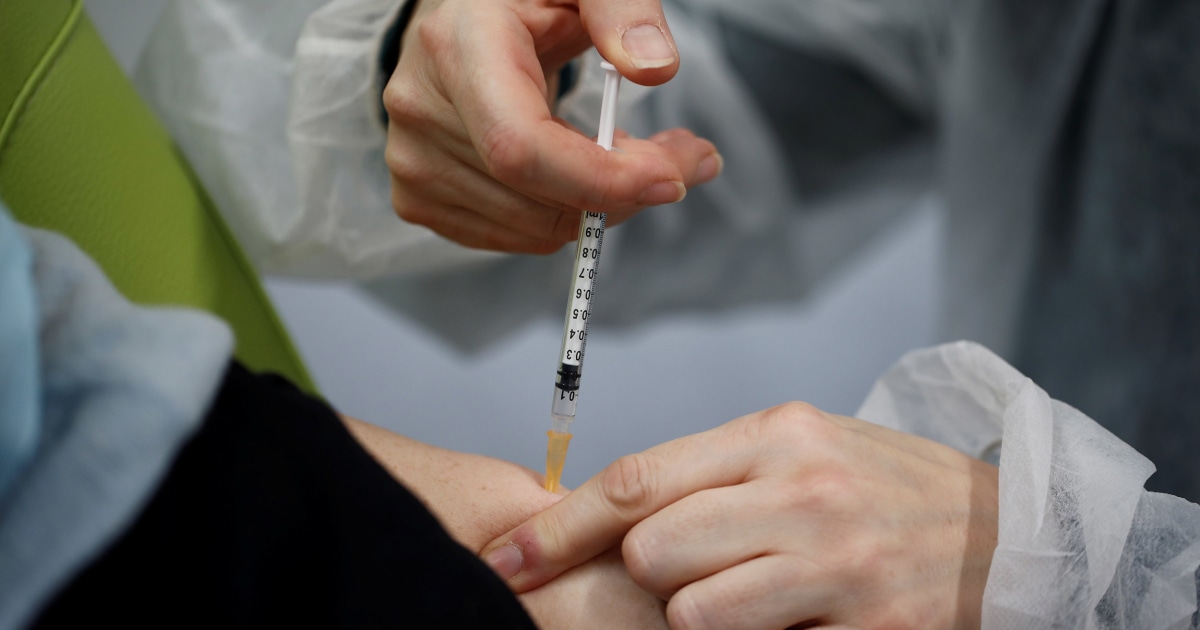LONDON – The European Union threatens to restrict the export of Covid-19 vaccines manufactured in the bloc amid growing anger over the slow implementation of immunizations.
“EU member states are united: vaccine developers have social and contractual responsibilities that they need to fulfill,” said health commissioner Stella Kyriakides on Monday night, after two tense negotiating sessions with representatives from vaccine maker AstraZeneca , in which the commissioner said “insufficient explanations” were provided.
AstraZeneca took EU officials by surprise last week when it announced that its initial delivery volumes for the Covid-19 vaccine, developed in collaboration with the University of Oxford in the United Kingdom, would be less than originally anticipated due to manufacturing problems. in Europe. The company did not say how much the volumes will be lower.
This happened just a week after Pfizer-BioNTech announced that there will be a temporary reduction in its vaccine deliveries to the bloc, also without stipulating the size of the reduction, but ensuring that it will resume its delivery schedule for the EU this week.
Both AstraZeneca and Pfizer have vaccine factories in Europe.
Despite exercising significant political and economic power, the bloc, with a combined population of 450 million people, was left behind in other parts of the world in the Covid-19 vaccination.
Israel, the United Arab Emirates and the United Kingdom are far ahead of EU countries, according to the Oxford University global vaccination tracker website.
Britain, which recently left the EU, has so far administered more than 10 doses per 100 of its residents, while the EU’s best performing country, Denmark, reaches 3.6 doses per 100 residents. Germany and France are in 2 and 1.6 doses, respectively.
Therefore, the delays are a significant blow to the union’s goal of vaccinating 70% of its entire adult population by the end of the summer.
The EU also started its vaccination efforts weeks after the United Kingdom and the United States amid tighter regulatory controls.
Kyriakides said that the EU intends to “take all necessary measures to protect its citizens and their rights”.
“In the future, all companies that produce vaccines against Covid-19 in the EU will have to provide advance notification whenever they want to export vaccines to third countries”, without going into details on how future restrictions would work.
Download the NBC News app for breaking news and politics
Other EU officials did not answer questions about whether they would go so far as to stop future exports, or provide more details on the exact measures they would be willing to take.
On Tuesday, German Health Minister Jens Spahn also called for restrictions on the export of coronavirus vaccines in an interview with German broadcaster ZDF.
Vaccines coming out of the EU will need a license, “so that we at least know what is made in Europe, what comes out of Europe and when it comes out of Europe, whether there will be fair distribution,” he said. He did not say exactly how the license would work.
“We understand that the proposed notification process by the EU aims to increase transparency and is not intended to restrict the global supply to patients,” a Pfizer spokesman told NBC News in an email that also noted that the US vaccine supply comes from Kalamazoo, Michigan. “But it is critical that governments do not impose export restrictions or other trade barriers that can create uncertainty and interrupt vaccine supply to patients around the world.”
AstraZeneca did not respond to requests for comment.
AstraZeneca has several orders from countries outside the EU, with the largest advance purchase coming from the United States at 500 million, but Canada, Japan, the African Union, Brazil, Australia and others also have deals for millions of doses, according to compiled data. by Duke University. Likewise, Pfizer has several businesses with countries outside the EU, including 200 million for the US and 100 million for China.
The AstraZeneca vaccine has not yet been approved in the EU, but it is expected to receive the green light from the bloc’s medical regulator this week. The EU has pledged to buy 300 million doses, with an option of another 100 million.
The EU has strategically negotiated the purchase of bulk vaccines for all its member states to distribute vaccines throughout the bloc simultaneously to avoid internal competition and logistical challenges.
The EU’s move to restrict vaccine exports has already drawn criticism from authorities in the UK, which has acquired its own supply of vaccines, becoming the first nation to launch the Pfizer vaccine in December.
“It looks like a childish and spiteful way to behave,” David Jones, a former Brexit-supporting minister, told the British newspaper Telegraph, adding that it looks “terribly like blackmail”.
AstraZeneca and EU officials are expected to resume discussions on Wednesday.
Vivi Vitalone and Andy Eckardt contributed.


